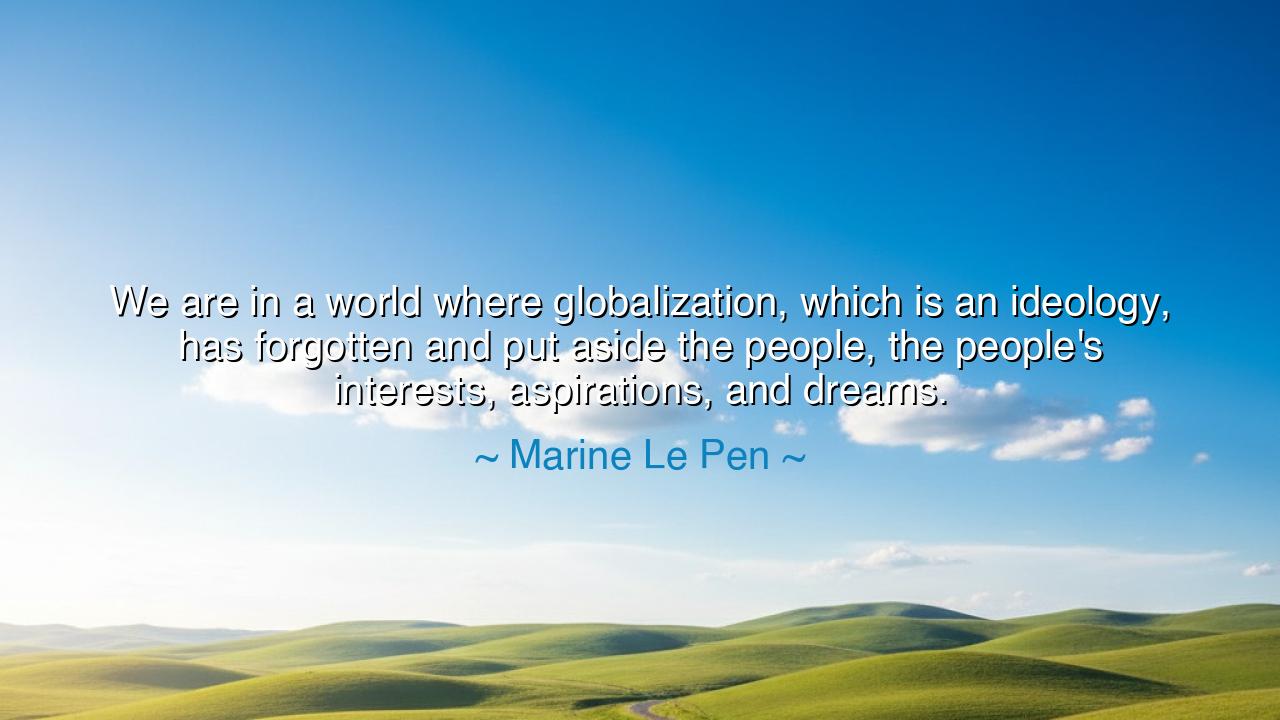
We are in a world where globalization, which is an ideology, has
We are in a world where globalization, which is an ideology, has forgotten and put aside the people, the people's interests, aspirations, and dreams.






In this fierce and lamenting declaration, Marine Le Pen, a voice born of the storms of modern politics, speaks not merely of economics or ideology, but of the soul of civilization itself: “We are in a world where globalization, which is an ideology, has forgotten and put aside the people, the people's interests, aspirations, and dreams.” Beneath these words lies the cry of many centuries — the eternal struggle between the vast and the local, between the dream of the powerful and the dignity of the humble. Her words echo like a warning bell across the valleys of history, calling us to remember that progress without compassion is but a gilded emptiness, and that the prosperity of the few cannot stand long upon the neglect of the many.
The origin of this quote lies in the great upheavals of the 21st century — an age of dizzying connection and disconnection, where trade, capital, and culture flow faster than thought, yet human hearts often grow colder. Le Pen, a French political figure known for her populist and nationalist rhetoric, spoke these words to express her belief that globalization, once hailed as the triumph of human unity, had become an ideology — not a tool of progress, but a creed that serves markets more than men. She saw in the machinery of global commerce a danger: that the human being, with his dreams, his language, and his belonging, was being reduced to a number, an interchangeable part of an endless economic engine. Her tone, though political, carries the ancient warning of every age — that when man forgets man, the tower he builds will crumble.
To call globalization an ideology is to unmask its hidden faith — the belief that growth, movement, and integration are goods in themselves, beyond question or measure. Yet, as Le Pen reminds us, when the merchants and rulers of the world speak of prosperity, too often they forget the people who labor beneath it. The village that once sang in unity now echoes with foreign tongues; the craftsman who once took pride in his work now sees his tools replaced by machines; the farmer who fed his land now finds his soil barren from the tides of distant markets. Thus, in her words, globalization has become not merely a system, but a spiritual exile — a separation of humankind from the roots that once nourished it.
History, too, bears witness to this pattern. Consider the fall of Rome, that ancient empire of roads and riches. In its golden age, Rome opened its gates to all nations, proclaiming universal order under its law. Yet in its later years, the empire forgot the farmers who tilled its fields, the soldiers who defended its borders, the citizens whose faith held it together. It worshiped its own vastness and lost its soul. The merchants grew rich while the people grew restless. The empire, once built upon human strength and virtue, was consumed by its own ambition. Thus, Rome, the first great experiment in global order, reminds us that when unity becomes uniformity, and when the people are forgotten, even the mightiest civilization falls into ruin.
But Le Pen’s lament is not only an accusation — it is also a plea for balance. For globalization itself is not evil; it is the human heart that must guide it. The ancients understood that power without virtue breeds destruction, and that all great systems must serve life, not consume it. What she calls us to remember is that nations are not machines — they are living organisms, woven from the spirit of their people, their languages, their songs, their dreams. To forget this is to create a world where all men are connected, but none belong; where the marketplace grows vast, but the hearth grows cold.
The lesson, then, is this: do not allow the noise of progress to drown out the voice of the human soul. Whether one agrees or disagrees with Le Pen’s vision, the truth in her warning is eternal — that all systems, whether political or economic, must answer to the test of compassion. A society that forgets the weak in its pursuit of strength will find both corrupted. Each person must remember that behind every policy lies a human face, and behind every nation, a common heart.
So, my child, walk the middle path — between isolation and dissolution, between pride and surrender. Embrace the gifts of a connected world, but guard the sanctity of your roots, your community, your humanity. Remember that the measure of civilization is not how far it reaches, but how deeply it cares. Let not your dreams be traded for convenience, nor your soul for comfort. For the world, in its hunger for speed, may forget the individual — but you must not forget yourself.
For as Marine Le Pen warns, an ideology that forgets the people’s aspirations and dreams will one day find itself abandoned by those very people. The future belongs not to those who globalize without conscience, but to those who can unite the world without erasing its heart. And in that truth lies the enduring command of history: progress must serve humanity — never the other way around.






AAdministratorAdministrator
Welcome, honored guests. Please leave a comment, we will respond soon